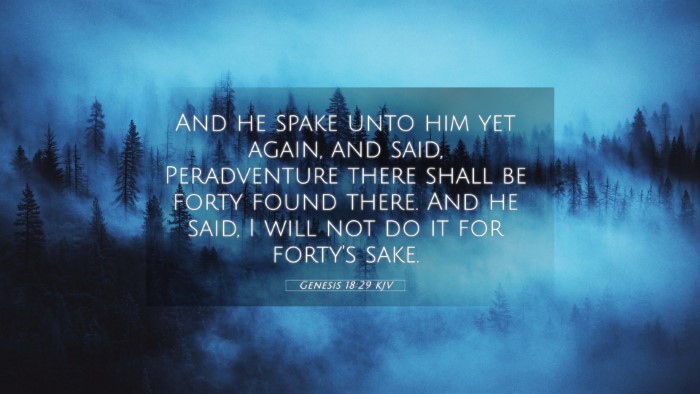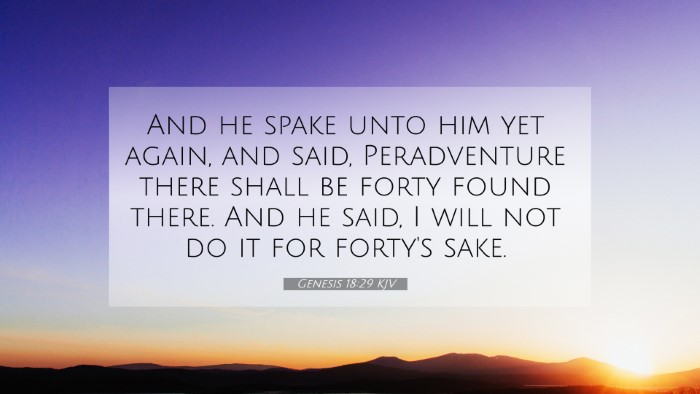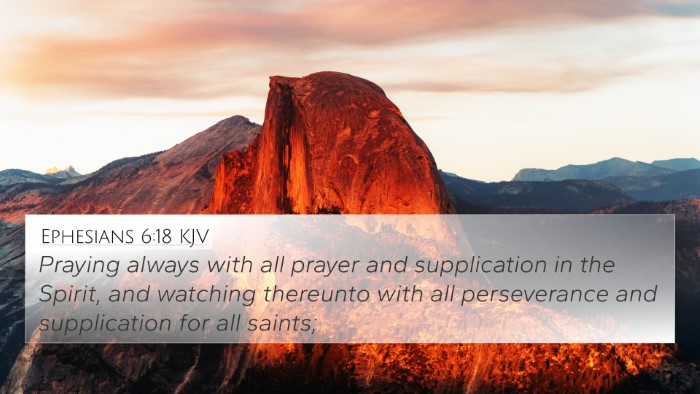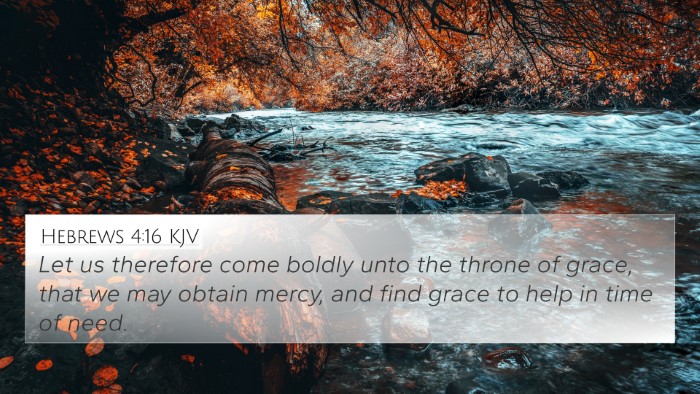Understanding Genesis 18:29
Genesis 18:29 states: "And he spake unto him yet again, and said, Peradventure there shall be twenty found there. And he said, I will not destroy it for twenty's sake." This verse is situated within the context of Abraham's intercession for the cities of Sodom and Gomorrah, where he pleads with God to spare the cities if righteous individuals can be found within them.
Meaning and Insights from Commentaries
-
Matthew Henry's Commentary:
Matthew Henry emphasizes Abraham's boldness in bargaining with God, showcasing his faith and concern for the righteous. This verse reflects God's mercy and willingness to listen to Abraham's plea, demonstrating the power of prayer and intercession.
-
Albert Barnes' Commentary:
Albert Barnes highlights the significance of Abraham’s persistence in prayer. He notes that Abraham’s approach was humble yet audacious, indicative of his relationship with God. The appeal to spare the city reflects a deeper theological principle regarding God's justice and mercy.
-
Adam Clarke's Commentary:
Adam Clarke points out Abraham’s understanding of God’s character. He interprets Abraham's negotiation as a reflection of a faith that trusts in God’s righteousness. Clarke notes that Abraham's dialogue reveals the compassionate nature of God, who is not willing to destroy the righteous with the wicked.
Bible Verse Cross-References
This verse connects profoundly with various biblical texts, showcasing the themes of intercession, mercy, and divine judgment. Below are notable references:
- Genesis 18:23-24 - The initial plea Abraham makes to God regarding the righteous.
- Job 42:8 - Job’s intercession for his friends highlights the power of prayer.
- James 5:16 - The effective prayer of the righteous emphasizes the importance of intercessory prayer.
- Luke 18:1-8 - The parable of the persistent widow illustrates persistent prayer and divine justice.
- Ezekiel 18:23 - God's desire for the wicked to turn and live reflects His mercy and concern for righteousness.
- Romans 9:22-23 - Discusses God's vessels of mercy and judgment, tying back to the portrayal of divine justice.
- 1 John 5:16 - Encourages believers to pray for those who commit sin, resembling Abraham's intercessory manner.
Connections Between Bible Verses
This passage serves as an exemplary model of how various scriptures interrelate and engage in rich theological dialogue. The connections between these verses can be articulated through these thematic understandings:
- Intercessory Prayer: The theme of praying for others can be traced from Genesis 18 through the teachings of Jesus in the New Testament.
- God's Justice and Mercy: Verses in the Old Testament regarding God's character resonate with New Testament teachings about grace.
- Faith and Relationship with God: Abraham's negotiation with God highlights faith as an essential part of the believer's relationship with the divine.
Thematic Bible Verse Connections
Genesis 18:29 invites readers to explore broader themes within biblical texts, providing a rich tapestry of interlinked verses:
- This verse can be seen as a precursor to the intercessory role of Jesus Christ, where He advocates for humanity before God.
- The principle of being spared for the sake of the few resonates with the New Testament notion of salvation through faith.
- This verse invites reflection on what it means to be righteous in the eyes of God, a theme prevalent in Proverbs and the teachings of Jesus.
Comparative Bible Verse Analysis
Exploring Genesis 18:29 through a comparative lens allows for a profound understanding of biblical narratives:
- Comparing Abraham’s negotiation with God to similar exchanges in Scripture emphasizes the relational nature of God.
- The juxtaposition with passages like Exodus 32:10-14 shows the continuity of intercessory themes throughout Scripture.
- Abraham’s plea echoes throughout the Psalms, where the psalmist often invokes God's mercy on behalf of the nation.
Inter-Biblical Dialogue
Genesis 18:29 facilitates dialogue between the Old and New Testaments, demonstrating enduring themes of mercy, righteousness, and intercession.
- This verse’s themes can be cross-referenced with the New Testament’s portrayal of Christ as a mediator between God and humanity.
- Such dialogues enrich our understanding of God's unchanging nature, as reflected in both testaments.
- The active participation of figures like Abraham in prayer exemplifies what believers are called to do today.
Closing Reflection
Genesis 18:29 serves as a powerful reminder of the importance of righteous intercession before God. Through this analysis, one can strive to understand their relationship with the divine while exploring the interconnections between various biblical texts.




